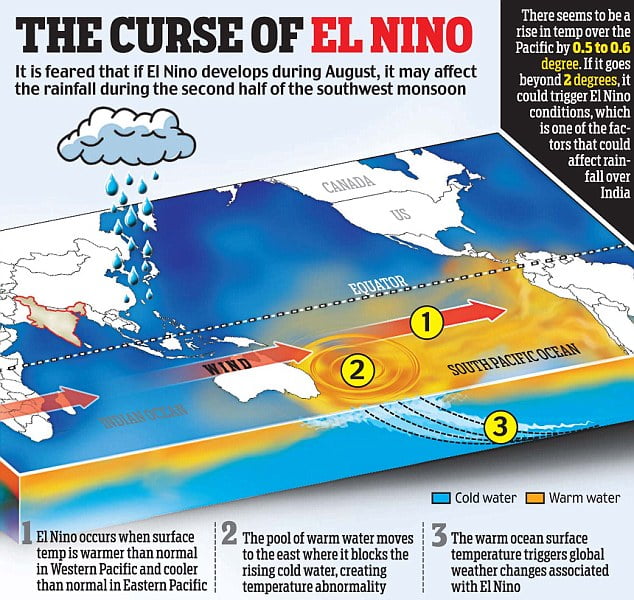A friend of mine recently said to me – “It does not even feel like rainy season, looks like we are having extended summers”
I am sure a lot of you must also be feeling very irritated with this humid weather. Do you want to know the reason for this? Here we at the Economy Decoded are there to quench your curiosity.
The reason for this is a weather phenomena called as ‘El Nino’. Let me explain you in detail about it.
The challenges for our country do not seem to end, the latest one being El Nino – meaning “Little boy” in Spanish. El Nino is an abnormal warming of surface ocean waters in the eastern tropical Pacific. It re-emerges after a gap of 4-40 years and continuous for a period of 9 months to a year on an average, causing below – normal monsoon.This period coincides with the warming of sea surface temperatures that affect wind patterns and trigger floods and droughts in different parts of the world.
The Year 2014 is predicted as an El Nino year which could be another challenge for Indian economy since there are predictions that there will low rainfall thus adversely affecting our agriculture production in turn having its consequences on already increasing inflation rate. We already had some of the worst memories with the previously El Nino which caused drought in the country. In 2009 conditions were observed, which caused the worst drought in 4 decade occurred leading to heightening inflation.
The predictions by Australian weather department say that the El Nino is expected to hit by September giving a sign of little relief with a hope that the rainfall will affect India only in the last month of its season.( Though we can see the effects of it from now itself).Also Indian reservoirs are filled up to 25% of their total capacity, which is significantly more than the 10-year average of 17% for this time of the year, making it easier for major crop producing states such as Punjab and Haryana to withstand weak monsoon rains.
There might be some comfort with the above said facts but the threat does not end there. Manymers are likely to suffer from less rain fall especially for an agriculturally dependent country like ours, which can have its effect even on the economy of the country. Contingency plans need to be prepared. Farmers should be warned. For example Farmers are advised to apply light and frequent irrigation to the standing crops or do soil mulching with straw and polythene to cope up with severe heat wave conditions that are prevalent in the country.
We definitely cannot stop the event from occurring but certain preventive measures can be taken to reduce the effects. Always remember – Prevention is better than cure.
(Some data mentioned in the article is obtained from Economictimes.com)



































